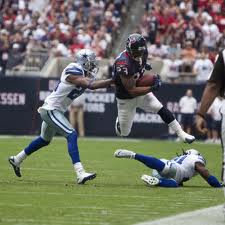
Now that I’ve drafted teams for both of my fantasy football leagues, I got to thinking about which NFL players eat whole, plant-based diets (no meat, poultry, fish, dairy, or eggs), and how being plant-based has impacted their NFL careers.
The NFL is one of the least vegan- and vegetarian-friendly places because of the game’s physical demands as well as social pushback from teammates, fans, and the media. Many athletes believed in the past that a plant-based diet couldn’t deliver enough calories and protein for high-level performance. Nutritionists realize now that’s not necessarily the case. Players can get the calories and protein they need by eating enough vegetables, beans, quinoa, nuts, seeds, and vegan shakes as long as they stay on top of what and how much they can eat. Although, in some cases, players who have tried being vegan or vegetarian have added small amounts of fish or chicken back into their diets to help them get more calories and protein to meet the demands of their jobs.
Houston Texans running back Arian Foster became vegan right before the start of the 2012 season, and by early November 2012 had 168 carries for 659 yards (more than almost all other players in the NFL) and 9 touchdowns. Foster said he became a vegan because he didn’t feel good when he ate big meals with meat. He believes that he’s creating a healthier, stronger body that will make him a better player.
Atlanta Falcons tight end Tony Gonzales first went vegan in 2007 after reading “The China Study”, which correlates diets rich in animal protein with the rise in chronic degenerative diseases such as cancer, heart disease, and diabetes, among others. Although Gonzales felt his best ever as far as energy and endurance, he noticed a loss of strength after eating vegan for 2 months. He’s since adopted an 80/20 approach: 80% plant-based foods and 20% animal protein, mostly fish. He credits his best performance to his diet, 1,000-yard gains, 96 receptions, and double-digit touchdowns in 2008. He said he has more energy, better focus, and more endurance. He hardly ever comes out of the game and is as strong as ever.
Running back Ricky Williams was one of the league’s first vegetarians. He changed his diet before his 2005 season with the Miami Dolphins because he felt strongly that it was a healthier way to eat. Williams said that it changed his game and it changed his body, and that he had tons of energy. As a vegetarian, Williams had 5 successful seasons, rushing for 1,121 yards in 2009.
Jacksonville Jaguars running back Montell Owens went vegan at the end of his 2010 season because he was looking for an advantage both on and off the field. He lost 15 pounds and felt lighter, faster, and cleaner. A strength coach told Owens he was too small and that he looked like a receiver, meaning that while he could run the ball, he couldn’t block the “big boys”. While Owens wanted to add more vegan protein to his diet, the team wouldn’t wait on him to experiment with vegan protein and threatened to replace him, so he started eating fish.
Seattle Seahawks guard Deuce Lutui became vegan after failing a physical with the Cincinati Bengals. He lost excess weight and says he is in the best shape of his life.
Dallas Cowboys fullback Tony Fiammetta switched from omnivore to vegan in only a week after reading some books that persuaded him to try the diet. He says he actually felt better on and off the field since making the dietary change. As for those who might be skeptical that he could maintain his size and strength without meat, Fiammetta says that "those people have some educational reading to do".
The good news is that players are starting to do research and become aware of the many benefits from eating a whole, plant-based diet. And those who have tried it have experienced increased energy that served them through entire games, better performance, and shorter recovery times. While the NFL is skeptical of players becoming vegan, teams are making more whole, plant-based options available to players, including salad bars, juicers, and plant-based superfoods, including kale, quinoa, almond butter, and whole wheat pasta.
Unfortunately for me Arian Foster and Tony Gonzales were snatched up in both my leagues before I could draft them. Hopefully I don’t get hammered too badly when I encounter them on opponents’ teams.
The NFL is one of the least vegan- and vegetarian-friendly places because of the game’s physical demands as well as social pushback from teammates, fans, and the media. Many athletes believed in the past that a plant-based diet couldn’t deliver enough calories and protein for high-level performance. Nutritionists realize now that’s not necessarily the case. Players can get the calories and protein they need by eating enough vegetables, beans, quinoa, nuts, seeds, and vegan shakes as long as they stay on top of what and how much they can eat. Although, in some cases, players who have tried being vegan or vegetarian have added small amounts of fish or chicken back into their diets to help them get more calories and protein to meet the demands of their jobs.
Houston Texans running back Arian Foster became vegan right before the start of the 2012 season, and by early November 2012 had 168 carries for 659 yards (more than almost all other players in the NFL) and 9 touchdowns. Foster said he became a vegan because he didn’t feel good when he ate big meals with meat. He believes that he’s creating a healthier, stronger body that will make him a better player.
Atlanta Falcons tight end Tony Gonzales first went vegan in 2007 after reading “The China Study”, which correlates diets rich in animal protein with the rise in chronic degenerative diseases such as cancer, heart disease, and diabetes, among others. Although Gonzales felt his best ever as far as energy and endurance, he noticed a loss of strength after eating vegan for 2 months. He’s since adopted an 80/20 approach: 80% plant-based foods and 20% animal protein, mostly fish. He credits his best performance to his diet, 1,000-yard gains, 96 receptions, and double-digit touchdowns in 2008. He said he has more energy, better focus, and more endurance. He hardly ever comes out of the game and is as strong as ever.
Running back Ricky Williams was one of the league’s first vegetarians. He changed his diet before his 2005 season with the Miami Dolphins because he felt strongly that it was a healthier way to eat. Williams said that it changed his game and it changed his body, and that he had tons of energy. As a vegetarian, Williams had 5 successful seasons, rushing for 1,121 yards in 2009.
Jacksonville Jaguars running back Montell Owens went vegan at the end of his 2010 season because he was looking for an advantage both on and off the field. He lost 15 pounds and felt lighter, faster, and cleaner. A strength coach told Owens he was too small and that he looked like a receiver, meaning that while he could run the ball, he couldn’t block the “big boys”. While Owens wanted to add more vegan protein to his diet, the team wouldn’t wait on him to experiment with vegan protein and threatened to replace him, so he started eating fish.
Seattle Seahawks guard Deuce Lutui became vegan after failing a physical with the Cincinati Bengals. He lost excess weight and says he is in the best shape of his life.
Dallas Cowboys fullback Tony Fiammetta switched from omnivore to vegan in only a week after reading some books that persuaded him to try the diet. He says he actually felt better on and off the field since making the dietary change. As for those who might be skeptical that he could maintain his size and strength without meat, Fiammetta says that "those people have some educational reading to do".
The good news is that players are starting to do research and become aware of the many benefits from eating a whole, plant-based diet. And those who have tried it have experienced increased energy that served them through entire games, better performance, and shorter recovery times. While the NFL is skeptical of players becoming vegan, teams are making more whole, plant-based options available to players, including salad bars, juicers, and plant-based superfoods, including kale, quinoa, almond butter, and whole wheat pasta.
Unfortunately for me Arian Foster and Tony Gonzales were snatched up in both my leagues before I could draft them. Hopefully I don’t get hammered too badly when I encounter them on opponents’ teams.



 RSS Feed
RSS Feed